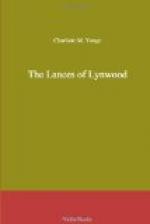“It is not in sight of these mountain peaks,” said Gaston, contemptuously, “that I am to be called a foreigner; and as to being landless, if I chose to take my stand on the old tower of Albricorte, and call myself Lord of the whole hill-side, I should like to see who would gainsay me. For name, I suspect you will find that many a man has trembled at the sound of Beranger d’Albricorte, to whom Ashton would be but that of an English clown. Moreover, in this camp I would have you to know that the question is, not who has the broadest lands, but who has the strongest arm. And, sir Squire, if you are not above listening to a piece of friendly counsel, to brag of those acres of yours is the surest way to attract spoilers. I had rather a dozen time trust Eustace in such company than you, not only because he has more wit, but because he has less coin.”
“Who is this man? What is his name?” asked Eustace.
“Le Borgne Basque, I know no other,” said Gaston. “We reck little of names here, especially when it may be convenient to have them forgotten. He is a Free Companion, a routier, brave enough, but more ready at the sack than the assault, and loving best to plunder, waste, and plunder again, or else to fleece such sheep as our friend here.”
“How could such a man gain entrance to the Prince’s pavilion?”
“Stout hearts and strong arms find entrance in most places,” said Gaston; “but, as you saw, he durst not appear at the upper table.”
The next morning the army began their march to the Pyrenees. They halted for some days at the foot of the hills, whilst negotiations were passing between the Black Prince and Charles the Bad, King of Navarre, who might easily have prevented their entrance into the Peninsula by refusing a passage through his mountain fastnesses.
When the permission was granted, they advanced with considerable danger and difficulty. The rugged paths were covered with snow and ice, which made them doubly perilous for the horses, and but for Gaston’s familiarity with his native hills, Sir Reginald declared that he could never have brought his little troop across them in safety.
At length they emerged through the celebrated Pass of Roncesvalles, where Eustace in imagination listened to the echoes of the dying blast of Roland. On the following evening he had the delight of reading his history in the veritable pages of Archbishop Turpin, which precious work he found in the possession of Brother Waleran, a lay-friar, in the employment of Sir John Froissart the chronicler, who had sent him with the army as a reporter of the events of the campaign. This new acquaintance gave very little satisfaction to Sir Reginald, who was almost ready to despair of Eustace’s courage and manhood when he found he had “gone back to his books,” and manifested, if not so much serious displeasure, yet even more annoyance, on this occasion, than when, shortly after,




